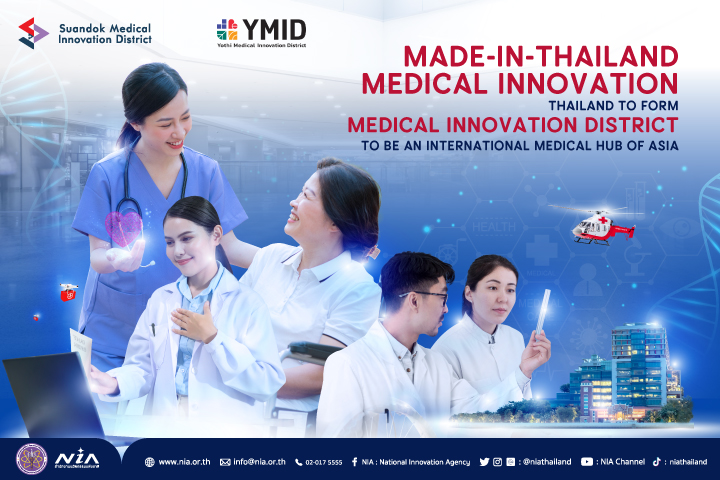- เกี่ยวกับเรา

เกี่ยวกับเรา
สำนักงานนวัตกรรมแห่งชาติ (องค์การมหาชน)
- บริการ

บริการ
การให้บริการของ NIA
- ข่าวสาร/บทความ

ข่าวสาร/บทความ
ความเคลื่อนไหวของ NIA
- ติดต่อเรา/แจ้งปัญหา

ติดต่อเรา/แจ้งปัญหา
ช่องทางในการติดต่อกับ NIA
Made-in-Thailand Medical Innovation Thailand to form Medical Innovation District To be an international Medical Hub of Asia
16 ธันวาคม 2565 9,777Made-in-Thailand Medical Innovation Thailand to form Medical Innovation District To be an international Medical Hub of Asia

Bangkok – November 25, 2022 - The National Innovation Agency (Public Organization) or NIA, under the Ministry of Higher Education, Science, Research and Innovation, disclosed that Thailand is a medical hub which foreigners are interested in using services at leading private hospitals. And the country is ranked in the top five out of 195 countries in the Global Health Security Index (GHS).
However, at present there is still a need to import medical devices and technology from abroad at a cost of up to 60 billion baht. Hence, NIA aims to upgrade MedTech, or medical innovation, through Deep Tech to promote creative medical innovation by Thais which will help increase the opportunity to take care of the quality of life for citizens and reduce the imports of medical innovations from abroad by establishing two innovation districts which are Yothi Medical Innovation District and Suan Dok Medical Innovation District.
Dr Pun-arj Chairatana, Executive Director of the National Innovation Agency, said that Thailand was one of the most admired destinations for foreigners around the world who were eager to use medical services. This was because of the readiness of world-class experts, and impressive services. Thailand has piles of leading private hospitals, making the country one of the world's most famous medical centers, and having received the ranking of the 5th highest country for health security out of 195 countries worldwide. However, Thailand still had to import medical equipment and technology from abroad at a cost of up to 60 billion baht annually, especially during the COVID-19 outbreak where medical equipment around the world had been becoming scarce and the complexity of the disease was increasing. This had become a challenge facing Thailand, he added.
“NIA sees that medical innovation or MedTech will help reduce the imports of medical equipment. People in general may think that it is only medical devices but, in fact, is much more diverse. MedTech is the application of innovation and technology to enhance and optimize medical services. This ranges from diagnosis, treatment, symptom monitoring and rehabilitation to physical health assessment and the prevention of disease. However, the development of the MedTech industry in the first phase will focus mainly on replacing the massive imports of equipment, such as plate screws to splint bones and wound dressings which involves less complex technology," he said.
Dr Pun-arj also said that currently medical innovation had grown exponentially. NIA therefore encouraged Thai entrepreneurs and local start-ups to apply DeepTech to medical innovation, such as AI technology for the diagnosis of disease and X-ray imaging, etc. Blockchain technology could also be used to solve problems with patients' medical records and to retain confidentiality along with 3D printing technology for prosthesis (artificial body parts) such as ear implants, artificial skin, and bone materials, he said.
He added that robots could assist in surgery while there were innovations for biotechnology related to vaccine development, etc. Medical innovations in this era involved more than treatment since there were a tool that had entered every process of healthcare. Sophisticated technology would make treatments harder to copy, resulting in competition in the market. There were new players all the time and innovating in new ways would increase the opportunity for taking care of people’s health, he added.
“Apart from competitive technology development and understanding regulations, testing, complying with standards and finding markets for support are also important. It is a challenge for NIA to build confidence in Thai medical innovation. The key market for medical devices is the public sector. If we can make MedTech products enter the government procurement list with 30-baht gold card disbursement rights and rights for civil servants, market forces will grow faster. When there is a market to support entrepreneurs, new startups will dare to step into the medical industry. This will enable people to have access to more modernized medical services at lower costs, including generating revenue for the country," he added.
Dr Pun-arj also said that the medical industry was one of the target industries that the government expected to be an important cog to drive the Thai economy of the future, or Thailand 4.0. Hence, NIA was piloting the development of spatial innovation based on the distinctive identity of areas through co-operation between government agencies to create an ecosystem to facilitate the attraction of capital investment to support the efficient development of the medical industry to be effective in the region.
The first area was Yothi Medical Innovation District (Yothi Road, Bangkok) which was a densely populated area with one of the highest densities of medical schools and nursing homes in the world, he said. Therefore, this area was suitable for developing an ecosystem to facilitate research studies and experiments on medical innovation in the country. It also connected government agencies, the private sector, innovative entrepreneurs, and investors to work together effectively to push Thailand to become the medical center of Asia and had developed more than 150 innovative projects and had investment capital circulating within the area of more than 300 million baht, he added.
"In addition, the network had been expanded to Suan Dok Medical Innovation District (Chiang Mai University in Chiang Mai Province) which is like a Sandbox or Playground for innovative entrepreneurs to learn together, both in terms of research and the clinical research innovation development that is in accordance with production standards and can actually be used in medical institutions," Dr Pun-arj concluded.
บทความที่เกี่ยวข้อง
- บริการ










